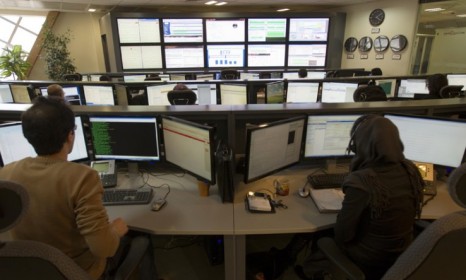Iran's alternate internet plan: Will it work?
Tehran doesn't want Western influence to seep in by computer, so it's building a government-controlled, Iran-wide-web

A free daily email with the biggest news stories of the day – and the best features from TheWeek.com
You are now subscribed
Your newsletter sign-up was successful
Iran is pushing online censorship to a new level with a two-year plan to phase out access to the world wide web, and establish a national internet completely disconnected from the outside world. Government ministers said the system would comply with Islamic law, making it "a genuinely halal network." The project would be an important part of Iran's effort to keep out Western ideas and morals — which Iran's Supreme Leader Ayatollah Ali Khamenei has referred to as the "soft war" — and would also make it harder for opposition activists to tap into social media to fuel their cause. Could Tehran really pull it off?
It will be difficult, but not impossible: "Not even China has taken such drastic steps," says Rick Moran at The American Thinker, although Beijing might be next if Iran really manages to cut off its citizens from the rest of the world. This would, of course, be a huge setback for democracy advocates, who rely on the internet to organize and to get help from the outside world. "I suppose it was inevitable that the technological advances brought about by the internet would eventually lead to the means to squelch it."
"Iran seeks its own state-run internet"
The Week
Escape your echo chamber. Get the facts behind the news, plus analysis from multiple perspectives.

Sign up for The Week's Free Newsletters
From our morning news briefing to a weekly Good News Newsletter, get the best of The Week delivered directly to your inbox.
From our morning news briefing to a weekly Good News Newsletter, get the best of The Week delivered directly to your inbox.
This will never work: Tehran failed miserably when it tried to cut off pro-democracy protesters from Facebook and Twitter, says Nick Farrell at TechEye. This latest plan might annoy the novices among the 11 percent of Iranians who have internet access now, but "the technically literate will create a dark web that will render the whole government effort useless."
"Iran has had enough of the internet"
Even if it works, the government will regret it: "The ambitious internet plan is not without its difficulties, says Adweek. And for the government, the worst-case scenario might be that they actually succeed. "Such a closed off system could stunt investment opportunities with other censor-minded nations such as Russia and China," and Iran desperately needs financial help to survive.
A free daily email with the biggest news stories of the day – and the best features from TheWeek.com
-
 ‘Those rights don’t exist to protect criminals’
‘Those rights don’t exist to protect criminals’Instant Opinion Opinion, comment and editorials of the day
-
 Key Bangladesh election returns old guard to power
Key Bangladesh election returns old guard to powerSpeed Read The Bangladesh Nationalist Party claimed a decisive victory
-
 Judge blocks Hegseth from punishing Kelly over video
Judge blocks Hegseth from punishing Kelly over videoSpeed Read Defense Secretary Pete Hegseth pushed for the senator to be demoted over a video in which he reminds military officials they should refuse illegal orders
-
 The billionaires’ wealth tax: a catastrophe for California?
The billionaires’ wealth tax: a catastrophe for California?Talking Point Peter Thiel and Larry Page preparing to change state residency
-
 Bari Weiss’ ‘60 Minutes’ scandal is about more than one report
Bari Weiss’ ‘60 Minutes’ scandal is about more than one reportIN THE SPOTLIGHT By blocking an approved segment on a controversial prison holding US deportees in El Salvador, the editor-in-chief of CBS News has become the main story
-
 Has Zohran Mamdani shown the Democrats how to win again?
Has Zohran Mamdani shown the Democrats how to win again?Today’s Big Question New York City mayoral election touted as victory for left-wing populists but moderate centrist wins elsewhere present more complex path for Democratic Party
-
 Millions turn out for anti-Trump ‘No Kings’ rallies
Millions turn out for anti-Trump ‘No Kings’ ralliesSpeed Read An estimated 7 million people participated, 2 million more than at the first ‘No Kings’ protest in June
-
 Ghislaine Maxwell: angling for a Trump pardon
Ghislaine Maxwell: angling for a Trump pardonTalking Point Convicted sex trafficker's testimony could shed new light on president's links to Jeffrey Epstein
-
 The last words and final moments of 40 presidents
The last words and final moments of 40 presidentsThe Explainer Some are eloquent quotes worthy of the holders of the highest office in the nation, and others... aren't
-
 The JFK files: the truth at last?
The JFK files: the truth at last?In The Spotlight More than 64,000 previously classified documents relating the 1963 assassination of John F. Kennedy have been released by the Trump administration
-
 'Seriously, not literally': how should the world take Donald Trump?
'Seriously, not literally': how should the world take Donald Trump?Today's big question White House rhetoric and reality look likely to become increasingly blurred